#labor law
Text
“…the NLRB said that moving forward, when unions request recognition based on majority support, employers must either recognize and bargain with a union or file a petition seeking an election.
“However, if an employer seeking an election commits unfair labor practices, the petition will be dismissed and the employer will be ordered to bargain with the union, the board said.”
This is really going to change some things in the US…
1K notes
·
View notes
Note
Since SAG AFTRA has also gone on strike, does that mean the negotiations between the WGA and executives went poorly?
This is a great question, because it allows me to do some educating about labor law!
Today's topic: "bad faith" bargaining.

While often honored more in the breach than the observance, U.S labor law requires employers to engage in collective bargaining with unions, once those unions have been recognized as the "exclusive representative" of the workers via card check or union election.
Because Leon Keyserling and Senator Robert Wagner were not idiots and could see it coming that employers would drag out negotiations in order to try to destroy the union through attrition, the Wagner Act of 1935 required employers to not just negotiate with unions, but to negotiate "in good faith" and made it a violation of the law to negotiate in bad faith.
Two major forms of negotiating in bad faith are "dilatory tactics" (deliberately using the procedures of collective bargaining and labor law more generally to delay the process) and "surface bargaining" (where the employer goes through the motions of meeting with the union, but refuses to engage in substantive discussions). This can include stuff like sending representatives who don't have authority to negotiate, refusing to schedule sessions or trying to unilaterally control the timeline, not asking questions or engaging in back-and-forth discussion, refusing to discuss topics that are germane to conditions of employment, and so forth.
These kinds of actions are considered Unfair Labor Practice violations and the NLRB can issue "cease and desist" orders and "affirmative bargaining" orders, as well as some rather creative "special remedies" that get around the Wagner Act's lack of monetary penalties. As that suggests, however, part of the problem is that because the Wagner Act doesn't have significant monetary penalties, a lot of companies will just budget a line item for breaking the law and treat that as the cost of doing business, while using the same dilatory tactics to appeal NLRB decisions through the courts in the hope that they can outlast the union. (This is why one of the most effective labor law reforms that could be passed in a Democratic Congress would be adding compounding daily monetary penalties and streamlining the ULP process in both the NLRB and the courts.)
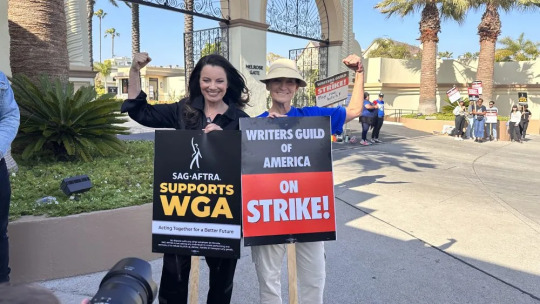
From what I've read of the negotiations, I think there's a pretty clear cut case that AMPTP engaged in surface bargaining and used dilatory tactics, with the intent to run out the clock and thus provoke a strike in which they believed economic pressure would force the union into surrender, essentially a lock-out without declaring a lock-out.
I think it's backfired on them. A big part of AMPTP's strategy for winning that strike was to divide-and-rule - hence why they came to an agreement with the Director's Guild - by getting through the lean months by filming and releasing shows and movies with already-completed scripts. Now that SAG-AFTRA is on strike, that lifeline of content is immediately cut - which means AMPTP is going to run out of revenue in the near future, which as WGA leaders have pointed out means bad quarterly earnings reports, which means stock prices tank, which means investors and boards of directors get angry and executives become the ones facing the prospect of losing their jobs at the same time that all the compensation they've structured as stock options to avoid taxes loses value.
476 notes
·
View notes
Text
We are on strike.
As of today, January 31st at 8am, the graduate student workers of Temple University Graduate Student Association are on strike.
This comes after over a year of negotiations, in which the university administration has continually obfuscated, talked down to us, and refused the spirit of negotiations. We have come in with proposal after proposal, shaving items down to meet them in the middle, while they lecture us about understanding the definition of negotiations and simultaneously resist any real negotiative change. Our contract expired last February.
Our demands have been painted as unreasonable. Greedy. Selfish. And yet the reality is that we have not received a cost of living adjustment in years. Our average pay among grad student workers is $19.5k a year, in a city where it now costs $37.2k to live. We request a pay of $32k. We are asking for healthcare coverage benefits for our dependents, more than 5 days of parental leave and 4 days of bereavement leave—reasonable requests considering the mass disabling event of the global pandemic. What’s more, our protections from overwork are thin and paltry. We only have each other. We only have the union.
Our strike fund can be found here, and more information is listed on our website. For the most up-to date info, you can follow our Twitter. We are ready to fight for a better Temple, and we will do all it takes to win.
963 notes
·
View notes
Text
🗣️ Please pay attention
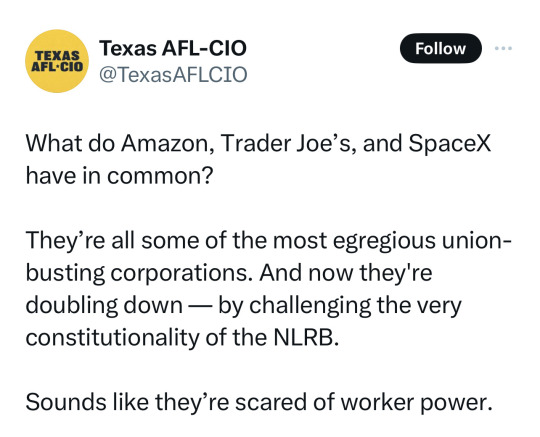

Amazon argues that national labor board is unconstitutional, joining SpaceX and Trader Joe’s
Amazon is arguing in a legal filing that the 88-year-old National Labor Relations Board is unconstitutional, echoing similar arguments made this year by Elon Musk’s SpaceX and the grocery store chain Trader Joe’s in disputes about workers’ rights and organizing.
The Amazon filing, made Thursday, came in response to a case before an administrative law judge overseeing a complaint from agency prosecutors who allege the company unlawfully retaliated against workers at a New York City warehouse who voted to unionize nearly two years ago.
In its filing, Amazon denies many of the charges and asks for the complaint to be dismissed. The company’s attorneys then go further, arguing that the structure of the agency — particularly limits on the removal of administrative law judges and five board members appointed by the president — violates the separation of powers and infringes on executive powers stipulated in the Constitution.
The attorneys also argue that NLRB proceedings deny the company a trial by a jury and violate its due-process rights under the Fifth Amendment. (source)
ICYMI, this is a case of corporations going, “7th Amendment Protections for me, but not for thee.”
It is strongly worth noting that in 2018 the John Roberts Court ruled 5-4 that companies can use forced arbitration clauses to stop people from joining together to fight workplace abuses - in effect denying individuals their 7th Amendment protections.
Subsequently, binding arbitration clauses used by corporations has proliferated; sneaking into all manner of common legal documents: personal banking applications, ordinary car loan applications, furniture purchases, and more. This is, unsurprisingly, a direct violation of the 7th Amendment that guarantees HUMAN BEINGS AND PEOPLE the right to a jury trial in certain civil cases and inhibits courts from overturning a jury's findings of fact. Republicans and SCOTUS are perfectly okay with corporations having more rights than workers and using forced arbitration to block people from having access to jury trials—but God forbid if corporations don’t have their right to a jury trial.
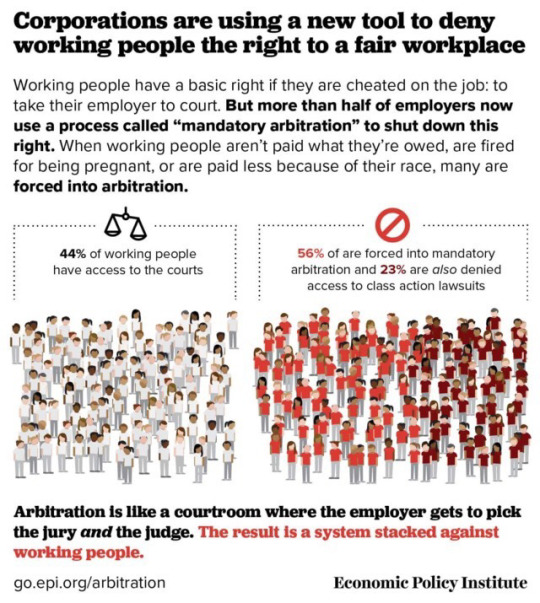
This legislative push to bestow corporations with more rights than people, while simultaneously taking away rights from human beings, has been nothing if not thoroughly and methodically done. At this rate, no corporation will ever need to fear a class action lawsuit again.
Amazon, SpaceX and Trader Joe’s are union busting.
But this latest case against the NLRB isn’t just an attack on labor and worker’s rights, it’s a fascistic attack on the very heart of fairness and democracy itself.
#politics#amazon#7th amendment#forced arbitration#spacex#trader joes#nlrb#workers rights#class action lawsuits#labor unions#union busting#collective bargaining#labor law#labor rights#scotus#john roberts court#john roberts#republicans are evil
100 notes
·
View notes
Text
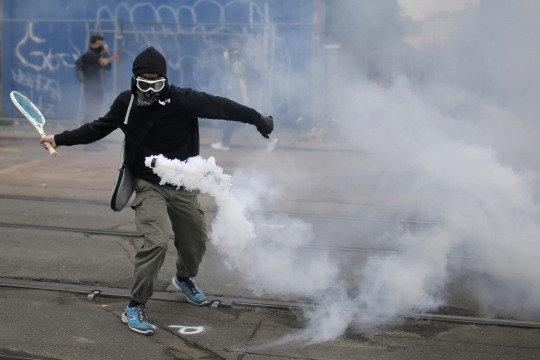
A protestor uses a tennis racket to return a tear gas canister during a demonstration to protest the French Government's proposed labor law reforms in Nantes, France (2016) photog. Stephane Mane
#protest#labor law#protester#france#paris#photography#nantes#stephane mane#reuters#demonstrators#urban#europe
71 notes
·
View notes
Text
Treegate Update: No Permit Was Pulled To Trim Ficus Trees Outside of Universal’s Gate 8, Says City Controller
(7/19/23, Deadline)
UPDATED: LA City Controller Kenneth Mejia revealed in a tweet Wednesday that no permit was pulled to trim the now-infamous Ficus trees outside of Universal’s Gate 8.
He added in a thread that “The City of LA’s Urban Forestry Division (UFD) will coordinate w/ StreetsLA’s Investigation & Enforcement Division (IED) to confirm if this case warrants the issuance of an administrative citation or hearing. If issued, the administrative citation fee starts at $250.”
Mejia had previously tweeted that the trees — which had provided shade for picketers during the ongoing strike before they were pruned over the weekend — are LA City managed street trees.
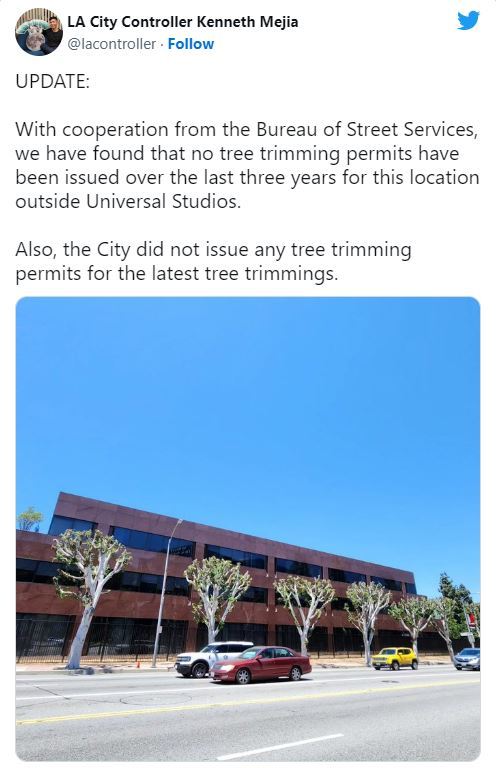
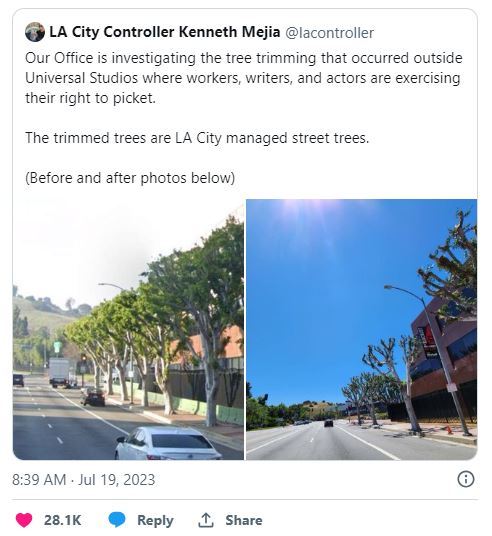
After members of the WGA discovered the thinned-out trees and made a stink via social media, the studio provided tents for additional shade.
PREVIOUSLY: Treegate just became a thing.
City Controller Kenneth Mejia has vowed to look into the newly pruned ficus trees outside of Universal’s Gate 8, after picketers drew attention to their thinned branches while marching in 90-degree-plus heat. Pine trees on the opposite side of Barham weren’t touched, and neither were a row of pepper trees behind the Universal fence near the production gate.
In a series of Tweets Tuesday, Mejia said his office is investigating what happened to the Ficuses on Barham Boulevard, which he said are “LA City managed street trees.” WGA picketers drew attention to their thinned out ranks on Monday. Universal owned up to trimming them but said in a statement it was done for “safety reasons” though it “has created unintended challenges for demonstrators, that was not our intention.”
“Trees are essential to providing Angelenos with significant environmental and public health benefits, especially during a heatwave,” Mejia said in a tweet. “Public Works’ Bureau of Street Services (StreetsLA) is responsible for maintaining the City’s 700,000+ trees in the public right-of-way.”
He went on to say in a thread that “code enforcement for street trees (including the pruning or removal of trees without a permit) is the responsibility of the StreetsLA Investigation and Enforcement Division. Violations can result in code enforcement citations.”
Separately, the fight over the studio’s construction on Lankershim Boulevard and its impact on the ongoing strike just got even bigger: The WGA and SAG-AFTRA today filed complaints with the National Labor Relations Board over the lack of safe pathways available for union members to picket.
“Within the past six months, [NBCUniversal Media] has interfered with, coerced, and restrained employees in the exercise of their rights under Section 7 of the [National Labor Relations] Act,” the Writers Guild of America, West, said in its filing (read it here).
Said interference includes but is not limited to “interfering with lawful picketing activity by designating as picketing locations areas where the public sidewalks have been covered up with construction fencing, forcing picketers to patrol in busy streets with significant car traffic where two picketers have already been struck by a car and by refusing to provide K-rail barriers to establish pedestrian walkways for picketers to use after Los Angeles Police Department advised the employer weeks ago in the interest of public safety to do so.”
SAG-AFTRA’s complaint reads in part: “On or around Thursday, July 13, 2023, the employer, through its agents and managers, instructed SAG-AFTRA to send its members to picket at the unsafe crowded location, exacerbating the dire public safety situation to interfere with striking members’ right to engage in the protected, concerted activity of picketing and patrolling outside the employer’s premises during a lawful strike.” Read the full filing here.
In response, an NBCUniversal spokesperson released this statement today: “We are aware of the WGA and SAG-AFTRA complaints. We strongly believe that the company has fulfilled our legal obligations under the National Labor Relations Act (NLRA) and we will cooperate with respect to any inquiries by the National Labor Relations Board on this issue. While we understand the timing of our multi-year construction project has created challenges for demonstrators, we continue to work with public agencies to increase access. We support the unions’ rights to demonstrate safely.”
The WGAW filing also cited “the egregious and flagrant nature of the employer’s illegal conduct and the irreparable harm, including the threat of bodily harm, caused by the above-mentioned violations of the Act.”
#treegate#TREE LAW#WGA strike 2023#SAG-AFTRA strike 2023#support the WGA#support SAG-AFTRA#support the unions#NBCUniversal#Universal Pictures#these fuckers#support labor#labor law#moustache twirling villainy#about as smart too
93 notes
·
View notes
Text
I fought for my labor rights this week. In case you were wondering, amid the SAG and WGA strikes, non-fiction (reality, documentary, etc) is still running because it’s Non- Union and we, especially the people at the bottom, are constantly getting taken advantage of.
All of the reality tv shows you love? The crews on those shows have no Union to protect them. And the Execs can do whatever the hell they want. State labor laws are the only things that protect us and they still manage to bend the rules to their favor.
Fingers crossed that non-fiction entertainment will unionize soon, but literally everyone (including scripted unions) is making it difficult.
#support the wga#wga solidarity#i stand with the wga#wga strike#sag strike#sag strong#sag solidarity#unions#labor rights#labor law#entertainment industry
138 notes
·
View notes
Text

(Pictured: Carnations laid in honor of the dead at the sidewalk of NYU's Brown Building. Photo by Leanna Renee Hieber)
On March 25, 1911, a fire broke out on the top floors of the Asch Building. The Triangle Shirtwaist Factory Fire took the lives of 146 people, most of them women and girls. As a NYC tour guide of over 15yrs, I speak about this site with vehemence. Never forget the importance of modern labor laws and the lives lost before we gained these rights. Andrea Janes and I wrote about this site, and its importance in the capacity of residual haunting, in our book A HAUNTED HISTORY OF INVISIBLE WOMEN. Our chapter on the fire, Industrial Monsters, is up on the Boroughs of the Dead blog: https://boroughsofthedead.com/industrial-monsters-ghosts-of-the-triangle-shirtwaist-factory/
Please support union workers and legislation aimed at shoring up worker protections. Honor the dead.
#nychistory#a haunted history of invisible women#on this date#labor history#trianglefire#triangle shirtwaist factory fire#factory#haunting#hauntedhistory#tour guide#new york history#labor law#labor rights#unionize
113 notes
·
View notes
Text
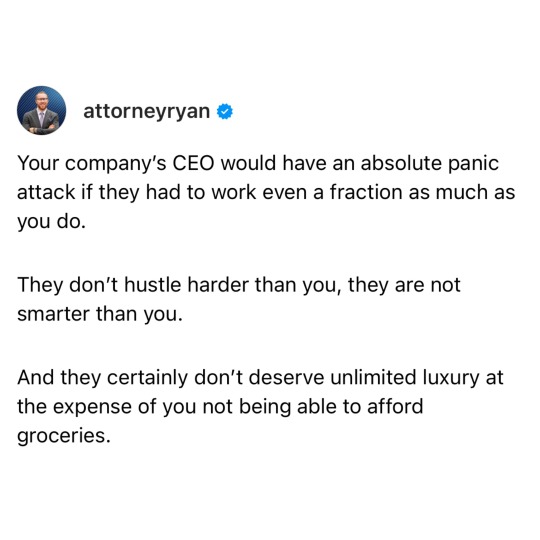
Abusive behavior is never needed, always wasteful and should change.
#ActorsStrike #SAGAFTRAstrike #SAGAFTRAstrong #UnionStrong #union #u1 #CEO #CEOs #work
#sag aftra strike#sag aftra strong#sag aftra solidarity#sag strike#sag aftra#support unions#union strong#union#labor unions#unionize#labor#labor law#ceo#ceos#work
35 notes
·
View notes
Text
A new federal law requires most employers to give “reasonable” pregnancy accommodations to workers. However, like many laws, the original language of the Pregnant Workers Fairness Act (PWFA) is somewhat broad and enforcement is complicated.
The federal agency in charge of enforcing the law is trying to help workers and employers understand it.
If an employer breaks this law, they don't go to criminal court. Instead, employment law relies partly on workers enforcing their own rights. People can sue employers who refuse to follow the law or report violations to the Equal Employment Opportunity Commission (EEOC) which tries to resolve the issue out of court and may sue on the employee’s behalf if that fails.
The EEOC has proposed a rule to clarify the PWFA’s language and guidance on it.
[Read the rest]
36 notes
·
View notes
Text
What to do when something illegal happens at work
When your boss does something illegal at work, it's common to freeze up because you're not sure what to do. Here are a few tips for how to handle those situations during and after:
While it is happening:
Keep yourself safe. In the moment, your first priority is always to keep yourself and others from physical harm and out of danger as much as possible. If any other advice I give you conflicts with that, your safety takes priority.
Make sure you know where you are. If you think your safety might be at risk, getting your bearings can be critically important. Take note of potential exit routes, hazards, the flow of traffic (both vehicle and foot traffic), cameras, and any safe areas you know of. Later, knowledge of your exact location may be very important in reconstructing events.
Check the time. Knowing exactly when something happened, and how long it took, will be extremely valuable.
Look around for witnesses, and try to bring some over if possible. Witnesses will both reduce the likelihood of more outrageous behavior and help you to take action afterwards. Do your best to remember who was there.
Say "please let me finish" every time you're interrupted, and count the number of times it happened. Bullies love to interrupt people at the first sign of disagreement, and then later they'll claim that nobody disagreed with them when instead nobody could get in a word edgewise. Saying "please let me finish" calls out the fact that they were interrupting, and a count of the times you were interrupted will help you protect yourself from being misinterpreted later.
Avoid agreeing to anything or signing anything if possible. You have the right to review any document that you're asked to sign, which usually includes taking the document and having it examined by an attorney. If you're being threatened with serious consequences if you don't sign immediately, write "signed under duress". If they're asking for a verbal agreement, try to get them to accept a "let me think about it/check my to-do list/etc" rather than a hard "yes". Even if the thing you'd be agreeing to is something you're okay with, it's still important not to agree to things when you don't feel like you're allowed to say "no"; in stressful situations, our judgment can be seriously compromised, and allowing yourself to be bullied into saying "yes" will set a bad precedent for further interactions.
After it's over, as soon as you're in a safe place:
Complete the WTWFU checklist
Send a follow-up email summarizing your understanding of what was communicated. It can be as simple as "just to ensure we understood each other, what I got was that you were telling me/us that [we'll be disciplined if we discuss our wages/contacting a union is a fireable offense/our pay will be docked if anyone submits a complaint to OSHA/etc], is that correct?". If there is information that protects you, such as a health condition or pregnancy you need accommodation for or a prior agreement that is being violated, include it in your email even if the company already knows. CC HR and any coworkers who were present and BCC your personal email*. Forward any responses to your personal email as well*.
Rescind any agreements you made. Either in the same email as step #2 or in a separate email, depending on what you think is appropriate, say "I didn't feel like I could safely say 'no' in that situation, so I'd like to rescind my earlier agreement until I've had some time to reconsider." If it's something you think you'd have otherwise agreed to, try to offer a time frame for an actual decision. CC HR and BCC your personal email*.
Collect any evidence you can, and make note of any evidence that exists but isn't accessible to you. This includes emails about the issue, any photos that were already taken or that you can safely and legally take,
If something illegal was done or hinted at, contact the applicable regulatory agency as soon as possible with all of the information above.
Consider arranging a consult with an employment law attorney -- consults aren't the same as retainers, they're considerably cheaper (or sometimes free, depending on your income and the possibility of a lawsuit) and can either turn into ongoing representation or just be a one-time service.
* Don't include information that you have a legitimate duty to safeguard, such as customer data, protected health information, or non-public market-affecting information. This does not include any information pertaining to working conditions, your compensation, regulatory compliance, or workplace safety -- the company isn't allowed to demand that you keep those a secret. Either try to get the point across without including the specific information that's being safeguarded, or censor it by replacing it with two underscores per replacement with generic descreptors as necessary (i.e. 'I have safety concerns about the release of our secret robotics project on January 10' becomes 'I have safety concerns about the release of our __[project]__ on __[date]__').
35 notes
·
View notes
Note
Which federal laws and policies would you get rid of or modify in order to help the American labor movement.
I was looking through the labor law tag on my blog and your ask reminded me I haven't actually written a comprehensive post about this on Tumblr. (Indeed, you'd have to go back to my old, old policy blog from 2009...it's been a while.)
One silver lining of the Sisyphean struggle to restore American labor law that's been going on since the 1970s is that the labor movement and their allies in Congress, academia, think tanks, and progressive media have been thinking through this very issue of "what reforms would make a real difference" for a long time. I'm not going to say it's a solved question, but the research literature is pretty robust.

For the purposes of this post, I'm going to focus on the three most recent reform packages: the Employee Free Choice Act that was the main vehicle during the Obama years, Bernie Sanders' Workplace Democracy Act (which was introduced repeatedly between 1992 and 2018), and the Richard L. Trumka Protecting the Right to Organize Act (PRO Act) that is the current proposal of the Democratic legislative caucuses. There's going to be quite a bit of overlap between these proposals, because it's very much an iterative process where allies in the same movement are trading ideas with one another and trying to stay abreast of new developments, but I'll try to tease out some of the similarities and differences.
EFCA
While EFCA contained a number of provisions that sought to close various loopholes in U.S labor law, the three main provisions largely target the flaws that have made it extremely difficult to win a union through the National Labor Relations Act process devised in 1935 that has turned into a Saw-style gauntlet thanks to the professionalization of union-busting and the Federalist Society's strategy of death-by-a-thousand-cuts:
"Card check." Probably the most common pattern of union-busting in the workplace today is a war of attrition by management waged by an industry of specialized law firms. Generally what happens is that the union files for election with a super-majority of ~70% workers having signed union cards, then management delays the vote as long as possible to give their hired "union-avoidance" firm to systematically intimidate, surveil, propagandize, and divide workers, up to and including illegally firing pro-union workers pour encouragez les autres. Over several months, what happens is that the initial 70% of pro-union support starts to erode as workers decide it's just too dangerous to stick their necks out, until the vote happens and the union loses either by a squeaker or a landslide.
Card check short-circuits this process by just saying that if the union files with a majority of cards, you skip the election and the union is recognized. And for all the pearl-clutching by the right, this is actually how labor law works in many democratic countries, because the idea of a fair election that lets management participate is an oxymoron.
Arbitrated first contract. In the event that enough workers keep the faith and actually vote for a union, management's next move is to draw out collective bargaining for a year or more. After a year, the original vote is no longer considered binding and employers can push for a "decertification" vote, which they usually win because workers either give up hope or change jobs. So this provision says that if the two sides can't reach an agreement on a first contract within 120 days, a Federal arbitrator will just impose one, so that at least for two years there will be a union contract no matter what management wants.
Strengthening enforcement. As I said above, one of the problems with existing labor law is that there are basically no penalties for management knowingly breaking the law; companies literally just budget in a line-item and do it anyway. This provision would allow unions to file an injunction against employers for unfair labor practices or ULPs (at present, injunctions are only required for violations done by unions), and would add triple back pay for illegal firings and fines of $20,000 for each ULP. This would make union-busting much more expensive, because companies routinely rack up hundreds and hundreds of them during a campaign.
Workplace Democracy Act
Sanders' proposal includes the main proposals from EFCA, and adds a bunch of additional reforms, like mis-classifying workers as independent contractors, banning captive audience meetings, making "joint employers" liable for labor law violations by franchisees, legalizing secondary boycotts, and requiring employers to report to the NLRB on all anti-union expenditures during a campaign and barring anyone convicted of an unfair labor practice from being hired for anti-union campaigns and making "union-avoidance" consultants liable for fines for ULPs (which would kill the "union-avoidance" industry, because they commit ULPs for a living).
PRO Act
The PRO Act is very much an updating of the previous efforts we've talked about. It bans captive audience meetings, allows for secondary strikes and boycotts, massively increases fines and allows for compensatory damages, ends mis-classification, speeds up the election process, etc.
It also contains a couple new and ambitious proposals:
it allows unions to sue management in court instead of having to complain to the NLRB, which opens management up to a very expensive legal proceeding and discovery.
it bans "right-to-work" as established by the Taft-Hartley Act.
it requires that any worker who's fired for pro-union activity be immediately reinstated while their unfair labor practice process or civil lawsuit is going through the process. This would be enormous just on its own, because it changes the entire veto structure of illegal firing. As it stands, employers fire people and maybe maybe have to pay some back wages in a couple years when the worker has found another job and is unlikely to come back. This would reverse the balance of power, such that the worker is immediately back and other workers can see that they can speak up without getting fired, which makes illegal firings a giant waste of time and money for management.
In terms of stuff that's not on this list that I would add, I would say that an enormous difference could be made by simply making it illegal for management to lock-out their workers or hire scabs. You do that, and unions can win almost every strike.
73 notes
·
View notes
Text
Work Expenses: Who Pays?
There are all sorts of work-related expenses out there that an employee might have to face, from the cost of their work uniform to the cost of cleaning their work uniform to bills for the cell phone they use for work calls to the cost of that laptop used for working from home.
The question is, under the law, when is the employer mandated to pay for such expenses, rather than leaving them to the individual employee to bear?
Summary: Under federal law, the only requirement is that expenses not bring employees' pay under minimum wage.
California and Illinois say the employer must cover "necessary expenditures and losses" including remote work equipment.
Montana, North Dakota, and South Dakota also say the employer must cover all the employee "expends or loses" due to work.
Washington D.C. says the employer must pay for required tools.
Iowa, New York, and New Hampshire require that the expenses be "authorized" by the employer or that employer and employee have an "agreement" beforehand for the employer to be liable for the costs. Iowa says such costs must be reimbursed within 30 days.
Minnesota requires that employee-paid work expenses be limited to $50 a month, and that the employer reimburse such costs at the end of the employee's employment.
Massachusetts requires that employers pay transportation expenses and the cost of uniforms specifically.
Federal law says only that if the employee's paying for expenses, that can't be used to effectively bring their wages below minimum wage level. So, if you're making minimum wage at a McDonald's, your employer can't then take the price of your work uniform out of your first paycheck, because then you'd effectively be making less than minimum wage.
This doesn't just apply to expenses directly paid to the employer, either; the statute specifically says that if the employee is required to buy their own tools required for a job, they have to be reimbursed if that would mean their pay going below minimum wage after deducting the cost of the tools from their pay.
But this only comes into play in connection to minimum wage. If your pay is high enough that your work expenses would still leave you above minimum wage, federal law doesn't say anything else making your employer liable for the cost.
But that's federal law. US law in general, and especially labor law, often has more specific restrictions within certain states, and this is no exception.
California law says that the employer has to pay for "all necessary expenditures or losses incurred by the employee in direct consequence of the discharge of his or her duties". In other words, if it's necessary for the job, under California law, the employer should be footing the bill. What counts as a "necessary expenditure or loss"? Excellent question. No definition is given for this in the statute, so it's all open for debate... though a recent court case suggests it includes remote working equipment, including for jobs that are normally in-person but went to remote work during the lockdown.
Illinois state law uses similar wording, with the employer paying for "all necessary expenditures or losses incurred by the employee within the employee's scope of employment and directly related to services performed for the employer." Illinois' statute does actually give a bit more definition to what counts as "necessary" here, however, and a 2023 amendment included specific factors to weigh when determining whether an expense is "necessary" and therefore should be paid by the employer. Like California, Illinois has specified that remote work equipment counts here.
Montana is similar as well, using the wording "all that he necessarily expends or loses in direct consequence of the discharge of his duties", as long as it's not "in consequence of the ordinary risks of the business in which he is employed." North Dakota's wording is nearly identical, with "all that the employee necessarily expends or loses in direct consequence of the discharge of the employee's duties as such" unless it's tools or equipment "also used by the employee outside the scope of employment". South Dakota also has similar wording, "all that the employee necessarily expends or loses in direct consequence of the discharge of the employee's duties".
Washington, D.C. law has the employer paying "the cost of purchasing and maintaining any tools required of the employee in the performance of the business of the employer."
Iowa's version is stricter, saying that the expense must be "authorized by the employer", but also sets a timetable, saying that such expenses must be reimbursed within thirty days' time. Similarly, New York says that the issue arises after there is an "agreement" between employer and employee about the expenses, and New Hampshire says that it must be "at the request of the employer".
Minnesota's got a different take on it--employers can make employees foot the bill, but once the employment ends, the employer has to pay the employee back for uniforms, equipment, supplies, and travel expenses that aren't just regular commuting. Also the initial out-of-pocket cost to the employee for such things can't be more than $50 a month. Although there's some weird exceptions and additional specifics for employees of motor vehicle dealers...
Massachusetts law specifically requires payment of "transportation expenses" and uniforms by the employer, with a definition given for what does and does not count as a uniform. The cost of uniform cleaning is covered if it requires "dry-cleaning, commercial laundering, or other special treatment".
Note that this is all assuming the employee would pay directly; laws vary somewhat if it is instead the employee charging (real, believed, and/or fraudulent) work expenses to a company card or account directly.
16 notes
·
View notes
Text
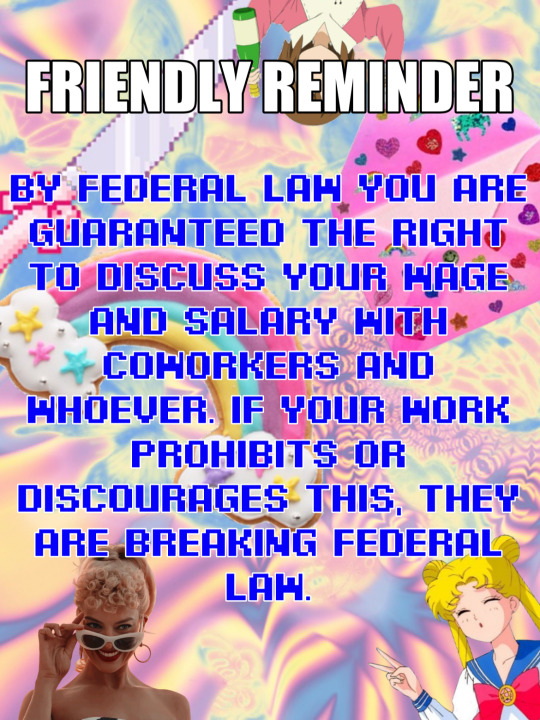
Friendly reminder that you can talk about your wage or salary with coworkers, and if your work prohibits or discourages this, they are breaking federal law.
Relevant to my new job 🙃
11 notes
·
View notes
Text
Mass firings, wage cuts and open hostility: workers are burnt out but still unionizing
158 notes
·
View notes
Text


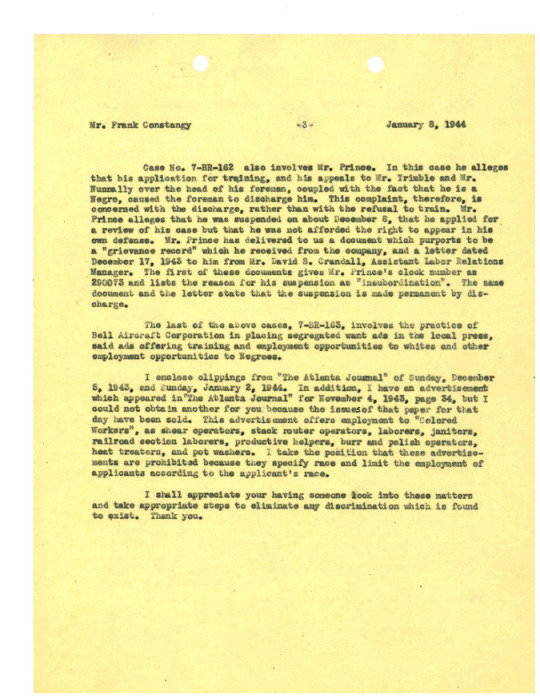
Memorandum from the War Manpower Commission to Bell Aircraft Corporation Regarding Four Discrimination Cases
Record Group 228: Records of the Committee on Fair Employment PracticeSeries: Closed Case FilesFile Unit: Bell Aircraft Company 7-BC-160
[handwritten in upper right corner [above & ("2/15") below typewritten date:] ] Refer On 2/15 [/handwritten in upper right corner] [struck through] 1/29 2/8 [/struck through] Mr. Frank Constangy Jan. 8, 1944 Deputy Regional Director, WMC A. Bruce Hunt Regional Office, FEPC Bell Aircraft Corporation 7-BC-160 7-BR-161 7-BR-162 7-BR-163 This memorandum is in reference to four cases involving Bell Aircraft Corporation, Marietta, Georgia, which has programs both under Apprentice-Training Service and Training-Within-Industry. In accordance with our telephone conversation of January 5, I am referring these cases to you. Case No. 7-BC-160 involves the complaint of Max Block, 1284 Oxford Road, Atlanta, Georgia, which was filed on December 20, 1943. Mr. Block alleges that he was denied employment because he is Jewish. According to Mr. Block, he was formerly president of Block Garment Company, Inc. in New York City and had 21 persons in his employ. He states that he severed his connection with the company upon being admitted to the New York State Bar as an attorney in June, 1941, that he practiced law in New York State for a little more than a year, and that he was then engaged in the Legal Department of Calvert Distillery Company, Relay, Maryland for approximately 7 months, about which time he came to Atlanta to join his brother, Daniel Block, an engineer at Bell Aircraft. Mr. Block alleges that on or about December 15, 1943, he filed an application in his own handwriting for employment with Bell Aircraft, stating thereon his nationality as "American" and the nationality of his parents as "Russian", that he filed the application with a Mr. Mayfield, an employment clerk at 426 Marietta Street, that the application was referred to a Mr. Flood in Marietta, Georgia, and that Mr. Flood stated that the application should be referred to a Mr. Redfern in the Atlanta office. Apparently Mr. Flood is the head of a department at the plant, and the complaint alleges that Mr. Flood expressed the belief that the complainant was qualified for more important work than that in Mr. Flood's department. Mr. Block further alleges that Mr. Redfern stated to Mr. Flood that Mr. Block might be qualified for employment for the position of Employment Counsellor, and that Mr. Block was referred to Mr. Redfern. Mr. Redfern apparently was not in his office when Mr. Block called upon him and Mr. Block [full transcription at link]
11 notes
·
View notes